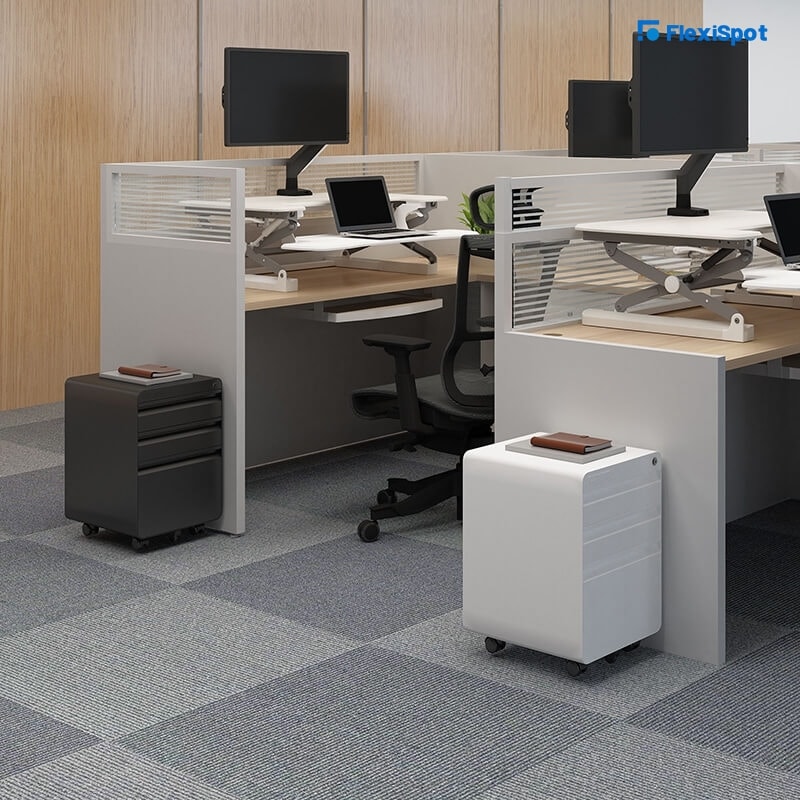Each of us has our own unique approach to creating the ideal working environment. Some like to put images of our loved ones on our workstations, while others prefer a more minimalist style. Then there are many of us who must sift through piles of forgotten Post It notes or performs coffee cup Tetris before finding something on our desk.
It's worth noting at this point that there is still a line of thought that believes a "messy workstation equals a clear mind." However, when it concerns privacy and security, this notion is thrown out the window. We may have the best online database security, access firewalls, and desktop security procedures in the world, but if a person leaves an old Post It note with his password on it laying around, it might all be for naught.
What is a Clean Desk Policy?
Every day, you should remove any sensitive information about the company from the desk as part of a clean desk policy. USB sticks, business cards, notebooks, and printed papers are all examples of this. In a single day, a lot of papers, printouts, and notes might accumulate!
The primary goal of a clean desk policy is to ensure that they are appropriately filed or disposed of. This should be supplemented with a "clean screen" policy at times too, which requires you to log off each time you leave the computer.
Why Have a Clean Desk Policy?
The clean desk policy serves two purposes: security and increased productivity at work. A clean desk policy may seem oppressive at first look, but apart from contributing to overall workplace cleanliness and fostering practical working settings, it also ensures the organization's security from outsiders, including employees!
More concerning than the occasional misplaced pen is the protection of the company from hostile attackers. Leaving crucial papers lying about might be a violation of the data protection legislation in the worst-case scenario! If you're situated in the European Union, you should be aware of GDPR policies.
The GDPR regulations have been established to allow them to apply to both digital and physical data. As a result, a document hacked from the internet is just as important as a bit of paper stolen from an office.
Financial penalties of up to 5% of a company's yearly turnover may be imposed. Leaving your desk messy is a significant concern!
How to Put a Clean Desk Policy in Place?
It's a good idea to provide your staff a basic "Clean Desk Checklist" so they know whatever they can't and can leave behind. Employees who are unsure of what they may and cannot leave behind may get confused, resulting in lost time. It also helps if they can cross off the list when it's time to leave to confirm that the policy is being followed.
You can establish a clean desk policy in your workplace with a few easy changes:
Storage That Can Be Locked
Every clean desk policy should provide lockable workstations where workers can keep their papers and documents to simplify their lives. Carrying around the contents of one's workstation negates the whole idea! They need a secure location to keep their belongings.
Try this storage cabinet from FlexiSpot that is compact enough to fit into any office space and has a lock mechanism to store your precious documents too. There are removable hanging bars where you can add hanging file folders. It comes with two drawers to store documents or other office supplies. Organizing your items will make it easier to find them when you need them the most.
Encourage The Use of Electronic Documents
Keeping notes on the computer is the greatest method to prevent leaving essential information on paper papers lying about. Keep your business safe while also helping to preserve the environment! One solution is to include a message in the footer of your emails telling staff not to print emails.
Sending A Kind Email to Your Staff
At the conclusion of each day, a kind nudge to staff might help promote this behavior. Just ensure it doesn't come off as though you're penalizing them or being too protective. After some time, trying to ensure the clean desk rules are followed will become second nature.
Turn It into A Competition
Everyone enjoys receiving prizes. Rewarding people who follow the policy is arguably the greatest approach to support it and help it seem less harsh while also rewarding those who do. Remember, you don't really want the directive to become an email shaming Dave in the workplace.
Encouraging Senior Benefits Management
It's far more likely that an effort will succeed if it comes from the top down; ensuring that senior management supports the policy (and follows it!) is a wonderful approach to set a precedent for the rest of the company.
Desk Organizers Can Help
Just piling everything on the desk can result in chaos, which means you will never be able to find anything in time while working. A mesh desk organizer can help you sort through your files in a much better way. It keeps the desk clean and organized so that you can work efficiently without getting negatively affected by the mess on your table.
The Benefits of a Clean Desk Policy
There are numerous benefits of a clean desk policy that you shouldn't overlook as an owner or manager of an office.
Clean, Green, and Cheap
A clean desk policy encourages the usage of digital documents rather than printed copies. This promotes the paperless workplace and allows us to be more environmentally conscious since the typical North American uses around seven trees each year for paper. It also saves money by default since corporations in the United States spend roughly $120 billion each year on printing.
Keep Sensitive Data Under a Lock
The most apparent advantage of the clean desk practice is that it prevents critical information from being exposed to the public eye. Peripheral equipment, such as USB keys, must be locked up at the end of the workday to avoid data theft by opportunists. Check printers to ensure that papers are not left by or near the printer. At the conclusion of each meeting, the conference rooms should be cleaned and double-checked.
Security and Safety Compliance
As previously stated, maintaining a clean desk policy has the extra advantage of assisting you in meeting the ISO 27001 criteria. It also assists you in meeting other industry requirements, including the Health Insurance Accountability and Portability Act (HIPAA).
Secures the Business
According to a clean desk policy, passwords should never be written on paper or Post It notes. Password management must be handled as a distinct business policy, with password managers being used if necessary. Haphazard password management is like putting the office keys in a stranger's hand and telling them to use them as they please.
Clean Desks Look Good
The implementation of a clean desk policy results in a clutter-free workplace environment. This is very useful in today's open-plan workplace. It cleans up bothersome messes and keeps the scent of leftover food and old papers from accumulating. A clean desk policy simply makes the workplace more pleasant to work in.
In Conclusion
When you glance around your workplace and observe how your workers utilize their desk space, it may seem like enforcing a clean desk policy is an uphill battle. However, the advantages of adopting this step range from increased security to privacy protection, helping with security requirements, and making the workplace a pleasant place to work. Encourage your staff to adopt a clean desk policy for the benefit of both your company and their data.
Now that you know how to implement a clean desk policy, what are you waiting for? Ensure your workplace's desks are organized and clean now since it comes with numerous benefits.



